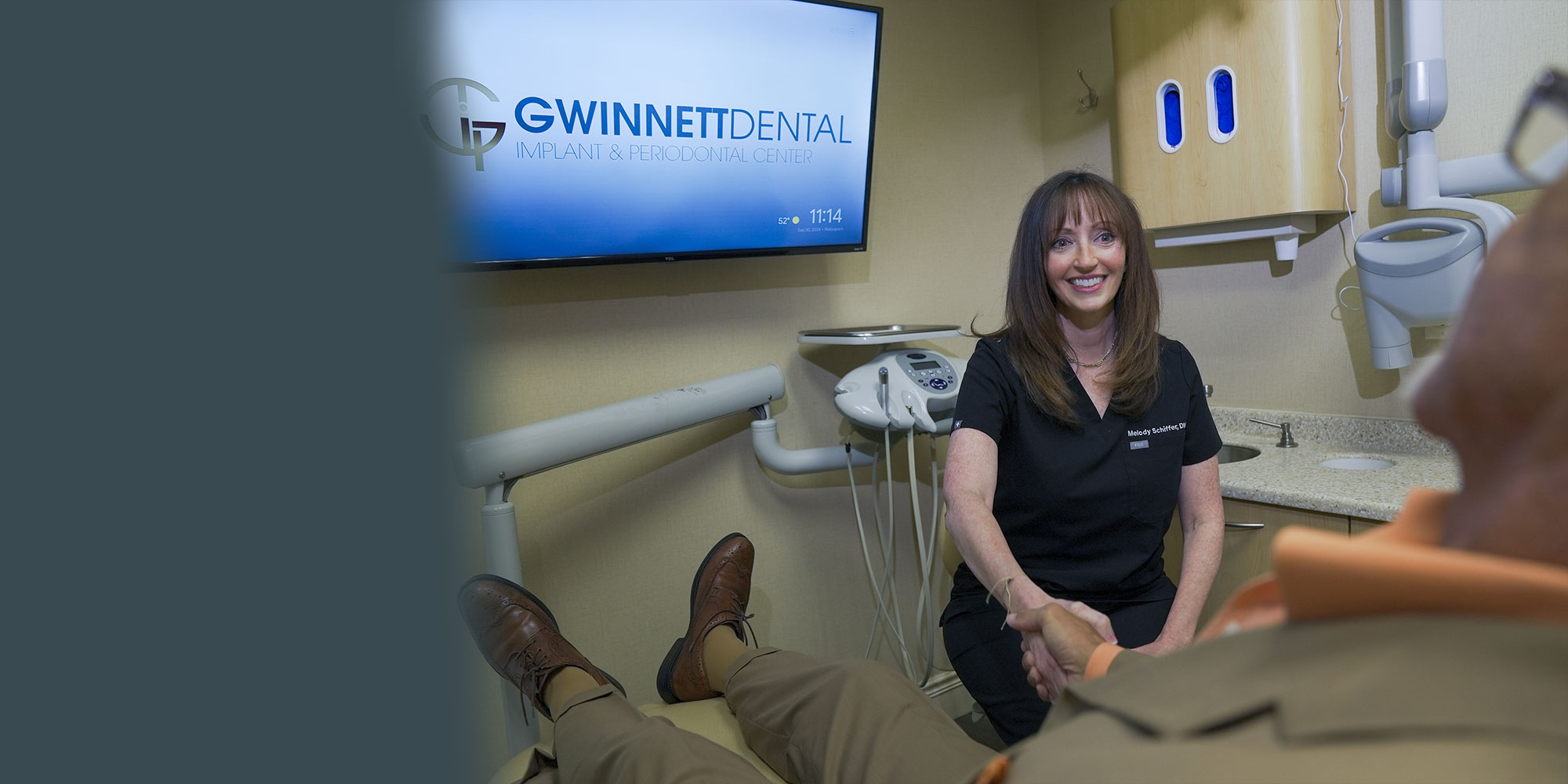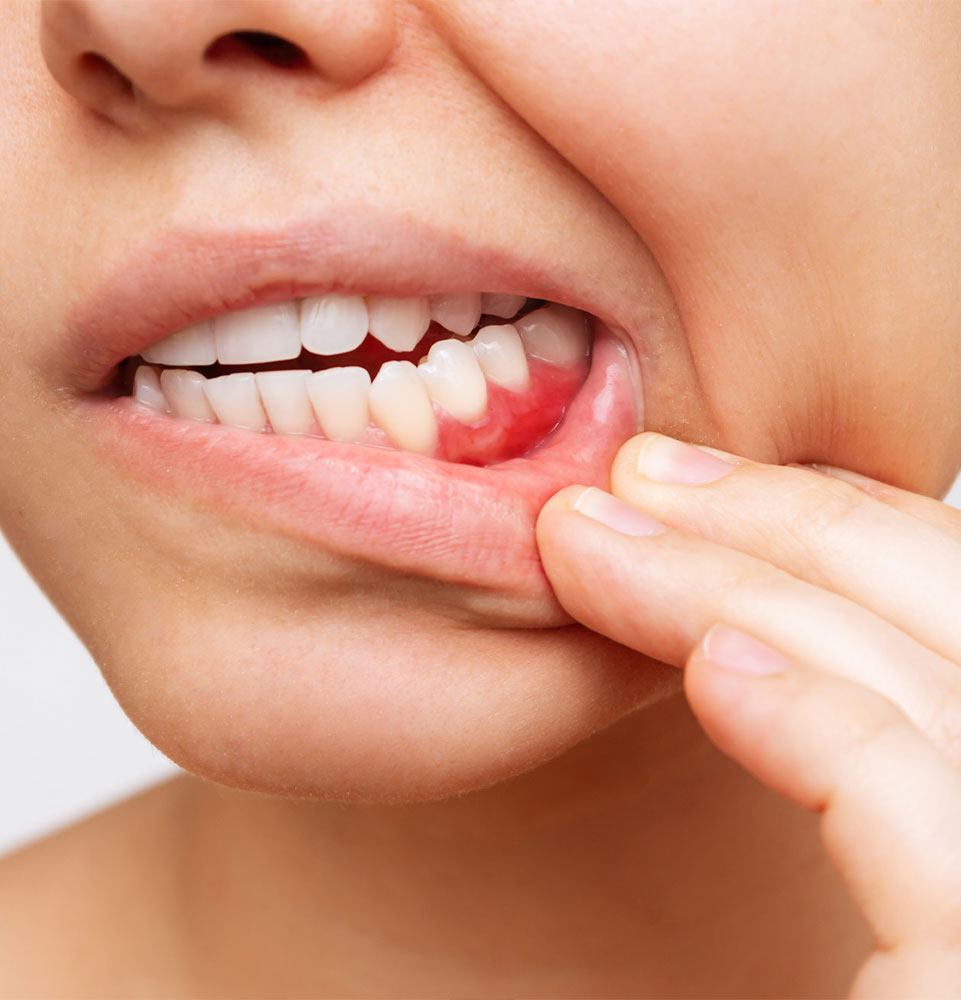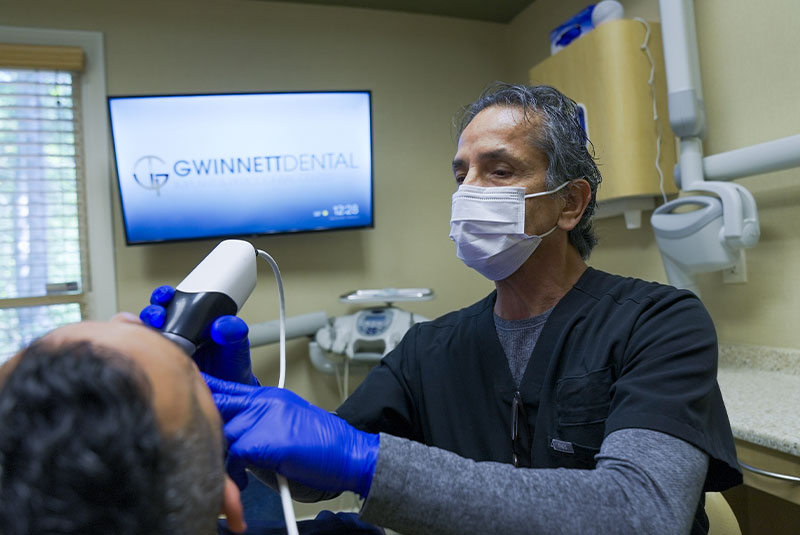Gum Disease treatment - Lilburn, GA
Expert Periodontal Treatments for Healthy Gums and Teeth

Understanding Gum Disease and How We Can Help
Gum disease, or periodontal disease, is a severe condition affecting the tissues surrounding your teeth. It begins with plaque buildup, leading to inflammation and gingivitis. If left untreated, it can progress to periodontitis, causing gums to pull away from teeth, leading to bone and tooth loss.
Gum disease causes oral health problems and impacts overall health, increasing the risk of heart disease, diabetes, and other conditions. Gwinnett Dental Implant and Periodontal Center offers effective solutions to stop gum disease progression and restore oral health. Our board-certified periodontist, Dr. Melody Schiffer, offers gum disease treatment and can help guide you to a healthy smile!

The Warning Signs of Gum Disease
- Red, swollen, or tender gums
- Bleeding gums
- Persistent bad breath or bad taste in the mouth
- Receding gums or longer-looking teeth
- Loose or shifting teeth
- Pain when chewing
- Formation of deep pockets between teeth and gums

Expert Treatment and Prevention
Gwinnett Dental Implant and Periodontal Center has extensive experience helping our patients throughout the Lilburn, GA area treat gum disease and prevent reoccurrence. We offer comprehensive periodontal disease treatment tailored to each patient’s needs. By addressing the root causes and symptoms, we help you achieve and maintain optimal oral health.
In addition to treating existing gum infections and periodontitis, we provide education and preventative care to stop gum disease from returning. To make these essential treatments accessible, we offer financing options to help manage the cost of gum disease treatments, ensuring you get the care you need without financial stress.
Comprehensive Gum Disease Treatments
Overgrown gum tissue can exacerbate gum disease by creating pockets where bacteria and food debris accumulate. Swollen gums may also give the illusion of smaller teeth. Crown lengthening is a dental procedure that exposes more of the tooth’s surface, making it easier to clean and enhancing the aesthetic harmony of the smile.
In addition to these benefits, a general dentist often requires crown lengthening to ensure the proper seating of a dental crown. Removing excess gum tissue and reshaping the gum line provide sufficient tooth structure for the crown to fit securely and function effectively. Crown lengthening reduces the risk of bacterial buildup, supports optimal oral health, and promotes a healthier, more aesthetically pleasing smile.
Periodontal disease can lead to gum recession, where the gumline moves down the tooth, exposing the root surface and compromising its stability.
Gingival grafting is a surgical approach to rebuild lost gum tissue and improve the tissue’s durability to improve the teeth’ stability. Grafting can improve the look of your smile, relieve tooth sensitivity, and prevent tooth loss.
Deep cleaning, scaling, and root planing are advanced dental procedures for treating periodontal disease and compromised tissue attachment. Typically serving as the initial step in periodontal treatment, these techniques involve meticulously removing bacterial buildup from the root surfaces of each tooth. This comprehensive approach aims to alleviate inflammation and enhance the attachment of healthy gum tissue, promoting improved oral health.
A frenectomy and a gingivectomy are dental procedures designed to enhance the health and appearance of your mouth. A frenectomy involves surgically removing the frenulum, a small fold of tissue between the lip and gums.
This procedure can improve speech by addressing tongue movement restrictions caused by an overgrown frenulum. It can also reduce the appearance of a gummy smile linked to a large or long frenulum. A frenectomy can assist newborns experiencing breastfeeding challenges due to an overdeveloped frenulum.
A gingivectomy is a surgical procedure to remove excess gum tissue around or between teeth. It is commonly performed to treat gum disease, helping to reduce bacteria and improve oral health in patients with gingivitis or periodontitis.
The procedure can also make teeth appear longer and more proportionate by exposing more of their surface. In addition, a gingivectomy is an effective way to improve the appearance of a “gummy smile” by reshaping the gum line. This treatment offers functional and aesthetic enhancements, promoting a healthier and more balanced smile.
Periodontal maintenance involves regular care to manage gum disease and prevent its recurrence. This ongoing treatment includes professional cleanings and check-ups to monitor your oral health. Consistent periodontal maintenance is crucial for maintaining the results of initial gum disease treatments and ensuring long-term oral health.
Jaw and gum resorption occurs when the bone and gum tissue deteriorates due to advanced periodontal disease. Treatments for this condition may include bone grafts and soft tissue grafts to restore lost tissue. These procedures are essential for supporting dental implants and maintaining the structural integrity of your jaw and gums.

